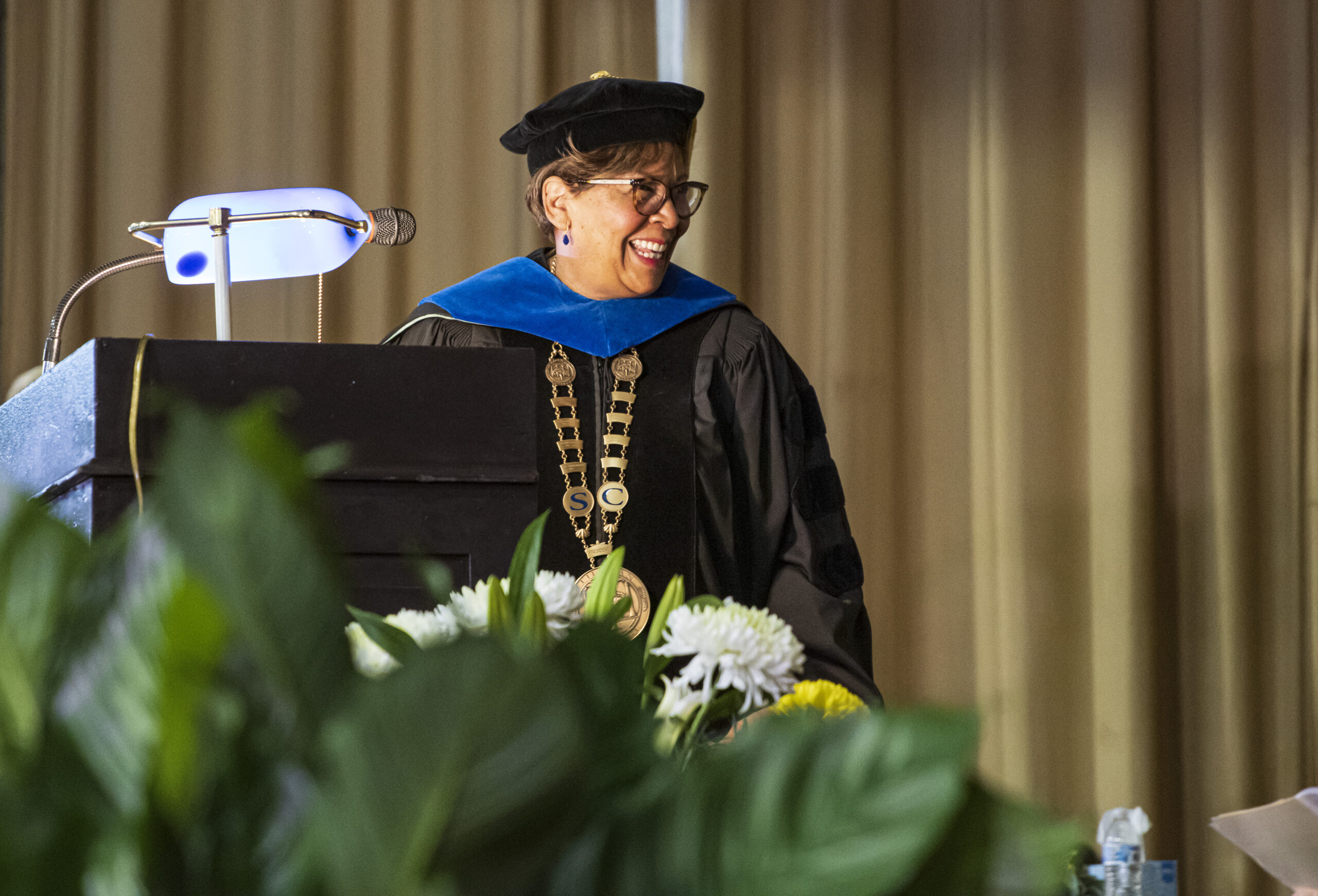Q&A with Dr. Cynthia Warrick, President of Stillman College

Five years ago, Dr. Cynthia Warrick answered the call to lead Stillman College, a Historically Black College in Tuscaloosa, Ala. and member of PIT-UN. As its president, Warrick has navigated the college through rocky times financially and academically. Today, Stillman is thriving and its public interest technology programs continue to grow. Here, she reflects on her journey and hopes for Stillman’s future as she prepares to retire in June, 2023.
Q. Stillman College is one of the newest members of Public Interest Technology University Network. What are the values that drew Stillman to PIT-UN?
Stillman is very proud of our involvement in this network of over 50 academic institutions to ensure that all community members have the knowledge and skills to understand and access technology, which is playing a greater role in our daily lives. As tools like AI-powered search engines come to the market, PIT-UN helps ensure that less educated, underserved, and communities of color will have a voice in the technology advances of today and tomorrow.
Q. As a liberal arts college, why is public interest technology important to the students and college?
When the public thinks about technology, the engineering field comes to mind. But everyone is not going to be an engineer, or even think like an engineer. A liberal arts education prepares students to examine ideas from multiple vantage points, and to critically integrate problem-solving through multi-disciplinary collaboration across historical, social and cultural norms. Public interest technology helps students view technology’s impacts through a liberal arts lens.
Q. Stillman recently received a $2.7 million federal grant to build a cybersecurity IT training center. What does this mean for the college, students and the community?
Stillman College is located in the 3 poorest census tracts in Tuscaloosa; and is the largest employer and contiguous land-owner in West Tuscaloosa, which is 94 percent African American. Under the Biden Administration Climate and Economic Justice Screening Tool, West Tuscaloosa is considered a Justice 40 community in several categories: Low Income, Higher education non-enrollment, Energy burden, Housing cost burden, Asthma, Diabetes, Heart disease, Low life expectancy, Low median income, Unemployment, and Poverty. Converting Geneva Hall (a former dormitory built in 1954) into a Cybersecurity and Information Technology Training Center will address some of these socio-economic issues among the residents in West Tuscaloosa. They will have access to state-of-the-art technology, education, and training enabling them for certificates, badges, and credentials, that will improve their quality of life.
Q. As the leader of a HBCU, what is your vision for the future of the college in advancing equity, racial and social justice?
HBCUs are institutions where students, faculty, and staff, can grow and develop without the burden of racism. Stillman, like most HBCUs, has been leaders in the fight for equal rights and social justice; producing leaders yesterday and today. I pray that our commitment to equality and justice will continue as long as those ideals are needed in the nation and the world.
Q. As the first female president for the college, what do you think was the biggest challenge and opportunity looking back at the past five years?
The biggest challenge facing Stillman’s future was the $40 million dollar US Department of Education HBCU Capital Finance Loan that was taken out in 2012, and because of the COVID-19 pandemic, would probably never be paid back. I led a contingent of other HBCU presidents with these loans to petition legislators to forgive the loans which totaled $1.6 billion dollars, with $400 million dollars of debt forgiveness for HBCUs in Alabama.
Q. Stillman College’s Cybersecurity DEI Clinics project is one of the 18 Network Challenge grantees this year. Can you describe the impetus behind the project and the impact it aims to achieve?
Stillman’s Cybersecurity diversity, equity, and inclusion clinics are based on the Citizen Clinic model developed at UC Berkeley’s Center for Long Term Cybersecurity. Clinics will be scheduled with our HBCU Consortium members in major urban centers: Birmingham, Houston, Nashville, and Memphis. These clinics will increase cyber risk awareness in underserved communities, introduce HBCU students to interdisciplinary cybersecurity training, and enhance also enhance awareness of ethical concerns coming out of the implementation of smart cities and smart homes.
Q. One of the college’s key missions is building diverse talent pipelines for public interest technology and other fields where students of color are underrepresented. What is your strategy and approaches to advance these goals?
Stillman College recognizes that cybersecurity and technology fields are a mainstay for the future. In November 2017, we experienced a ransomware hack that crashed our entire ERP system, exposing the reality that there were not any professionals in Tuscaloosa with the expertise and knowledge to address this issue. In December 2017, we joined the Independent College Enterprise consortium of eight colleges of similar size to share technology infrastructure, housed at the University of Charleston in West Virginia. We then developed a cybersecurity concentration to ensure that we were educating students in fields that were relevant to the challenges of today. We received grant funding from the National Security Agency to support our academic and research development and are on the path toward a Center of Academic Excellence in Cyber Education.
Congratulations to Dr. Warrick on her career and Stillman’s ongoing growth. To learn more about HBCUs in the Public Interest Technology University Network, visit our Member Directory and select the HBCU tag.
